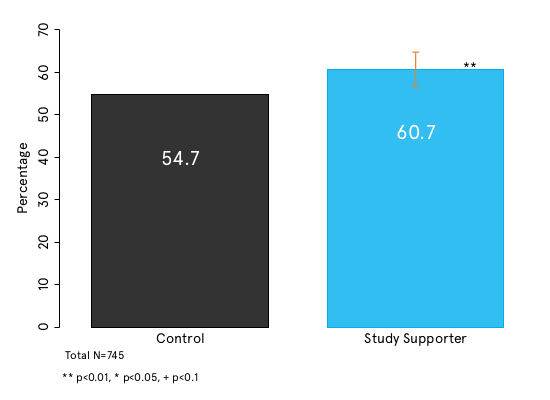Today we are publishing the latest in a series of annual Update Reports. It’s a proud moment for the team – and for the hundreds of government officials, funders, academics, clinicians, police officers, teachers and other practitioners we’ve worked with over the past year – giving us a chance to reflect on what we’ve collectively achieved, and what lies ahead.
There is so much material in the report that we are going to be writing blog posts over the coming weeks about some of the most interesting new findings. This is the first of these blogs, which also contains a few more general conclusions from the report.
One of the highlights from this year’s Update Report are the results we are publishing involving some 10,000 learners across 19 Further Education (FE) Colleges. The work was undertaken through BIT’s dedicated Behavioural Research Centre for Adult Skills and Knowledge (ASK), which is funded by the Department for Education. Each of the trials was a collaboration with a world-renowned academic and their teams – Angela Duckworth at the University of Pennsylvania, Geoffrey Cohen at Stanford and Todd Rogers at Harvard.
The trials with Angela and Geoff will be the subject of future blogs. Here, we’re going to focus on the Study Support trials undertaken with Todd Rogers. The trial sought to leverage the power of social networks by asking learners in FE Colleges to nominate two individuals who they felt were well placed to help them learn (it could be a family member or friend, for example). The ‘Study Supporters’ then received weekly text message updates, which provided information about the kinds of things that they might be able to help the learner with – such as an upcoming exam that they need to prepare for.
The texts encouraged the Study Supporters to engage with the learners. For example, one text read:
“Hi Luke, Bradley recently learned about non-linear graphs in his maths class. Please ask him what the formulas connecting distance/time/speed are. Thanks”.
The texts were designed to facilitate conversations between learners and those people in their lives who care about them and their situations, but do not always know exactly what they can do to help. That’s why each of the texts contained specific, actionable things the Study Supporter could help with – giving them licence, sometimes for the first time, to provide help at the right moment in time. While we did not intend to prompt response texts, we did receive messages like this one from Luke who was clearly wanted to know more:
“Can you pls tell me how he is doing in the class? I will work with him on the formulas between distance/time and speed. Thank you”.
So what happened as a result of these weekly prompts? The Study Supporter trial showed an 11 per cent increase in attendance amongst those individuals who had Study Supporters, relative to those who did not.
Effect of study support interventions on mid-year attendance
This finding is just one of around 70 that we set out in the Update Report. What they collectively reveal are two things. The first is that behavioural insights is becoming a mainstream pursuit of civil servants in the UK Government, and increasingly overseas – especially in those countries in which BIT has a presence: in Singapore, Australia and the USA. This is reflected in how many different policy themes are now covered. There are new findings and insights in areas such as Further Education; charitable giving; traffic offences; national statistics data collection; tax collection in the UK, developed cities and the developing world; how consumer markets should be regulated; and the impact of a 20 per cent price increase on sugared drinks.
The second is that the scale and complexity of the interventions being run in the UK and overseas is growing. BIT, together with our partners, is supporting interventions that involve much bigger populations. The typical sample size of our trials is now often in the tens of thousands, and sometimes bigger (as you will see when you look at the ‘N’ number next to every graph in the report). And the interventions reported often involve more complex psychological ideas, or more involved partnerships to deliver them, such as those related to value affirmation, ‘grit’ and social networks in our FE College trials.
The year ahead is likely to be another exciting one for anyone working in the field of behavioural insights, as the range and impact of behavioural approaches continues to grow around the world.


